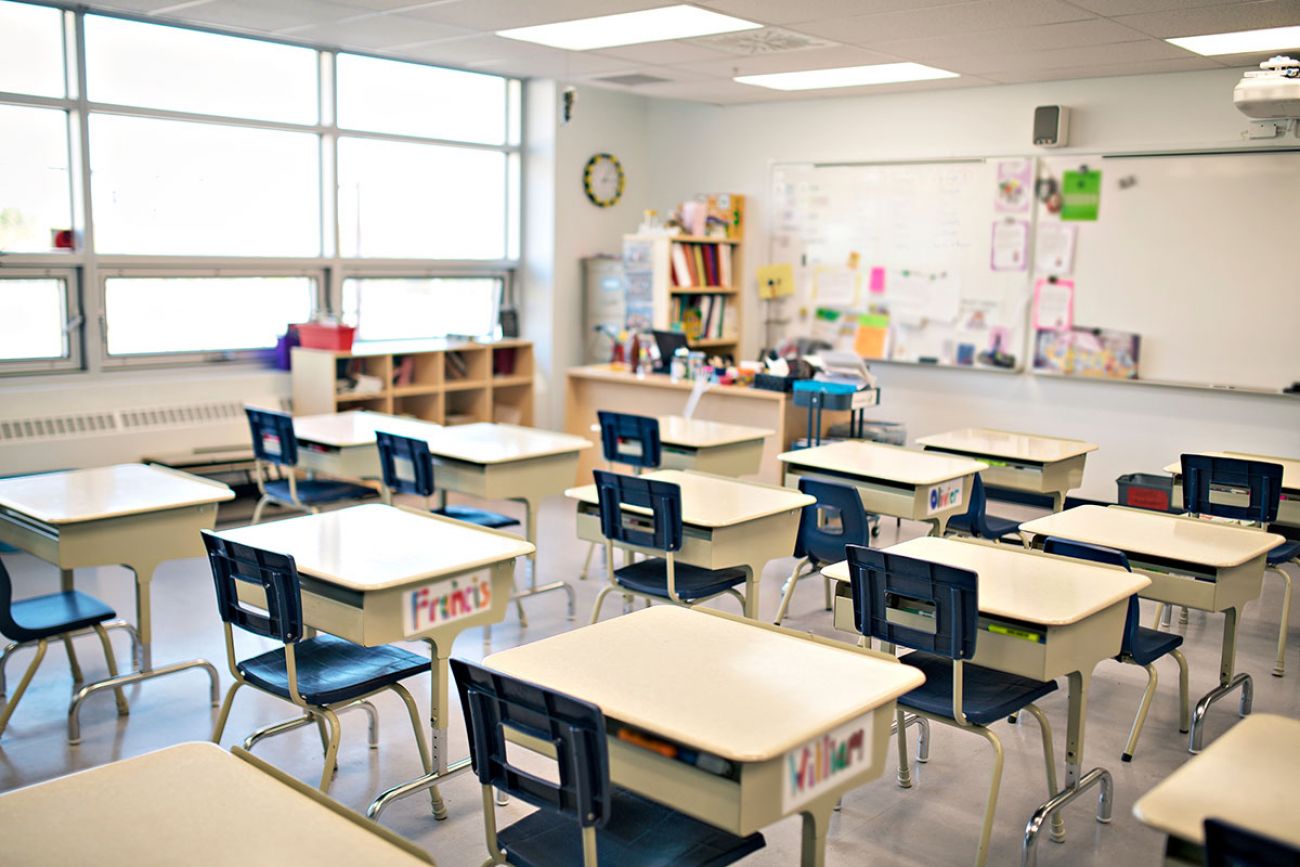What Michigan schools could look like under Tudor Dixon, Gretchen Whitmer

- Tudor Dixon centers much of her campaign on Gov. Gretchen Whitmer’s pandemic policies, including for schools
- Dixon’s priorities range from core policy (3rd-grade reading) to culture-war issues (drag queens)
- Gretchen Whitmer is likely to promote first-term accomplishments on school funding, literacy
When Michigan voters fill out their ballots for governor in November, they’ll pick between a school choice advocate who wants to strictly enforce the state’s third-grade retention law and an incumbent with a record of increasing school spending without raising taxes.
Tudor Dixon, a former conservative commentator and businesswoman in the steel industry, topped a field of five in Tuesday’s Republican primary. In November, she faces Democratic Gov. Gretchen Whitmer.
Whitmer has prioritized early childhood education, teacher recruitment and school-based health centers. She counts among her accomplishments closing the school funding gap and tripling the number of school literacy coaches, but she faced criticism over decisions she made in 2020 around pandemic-related school closures and mask mandates.
Related:
- Gretchen Whitmer: Freeze school supply taxes. Tudor Dixon: That’s a ‘gimmick’
- Michigan voting rights group forms super PAC against ‘election deniers’
- It’s ‘year of the woman’ and Michigan GOP likes Dixon’s odds against Whitmer
- Turnout numbers in Michigan governor primary could boost Gretchen Whitmer
A second term would give Whitmer another chance to advance her agenda of paying teachers retention bonuses, funding onboarding programs for new teachers, and piloting a home-based version of the Great Start Readiness preschool program. She included those items in her 2022-23 school aid budget proposal but was unable to get them through the Republican-controlled Legislature.
In an interview last month with Chalkbeat Detroit and Bridge Michigan, Dixon said her top education priority is ensuring “money follows the student.” She says that isn’t the same as vouchers, which she hasn’t taken a public position on.
Rather, she supports an Opportunity Scholarship program that Whitmer vetoed last year. Strongly backed by Betsy DeVos, who was U.S. education secretary in President Donald Trump’s administration, the proposal would allow Michigan residents to contribute money to scholarships in lieu of state taxes. Families could then use the scholarships for private-school tuition or to supplement public-school education with, for example, tutoring, books, speech therapy, or extracurricular programs.
DeVos and her family were among Dixon’s top campaign contributors and fundraisers. Dixon’s primary challengers seized on that connection in campaign ads that called DeVos a turncoat for her criticism of Trump over the Jan. 6, 2021, riot at the U.S. Capitol. (DeVos resigned within days of the riot.)
Dixon is a political newcomer who is relatively unknown around the state. With the GOP primary over, she now has a chance to define herself for general election voters, who may not have been paying attention to her policy positions during the primary season.
Whitmer is a former county prosecutor and legislative leader with progressive bona fides, the support of teachers’ unions, and an agenda that stood little chance to succeed under a Republican-controlled Legislature. She won her 2018 election against Republican Attorney General Bill Schuette by nearly 10 percentage points.
There is a chance either or both chambers of the Legislature could flip in November. That could embolden Whitmer to lay out a more progressive agenda than she has in the past, and that would likely include bigger increases in education spending.
For now, her campaign hasn’t put forward a slate of new education priorities, but instead has touted her first-term accomplishments. Those include increasing school funding four years in a row without raising taxes, ensuring every district has the same baseline funding, and budgeting $500 million for school construction and renovation. Whitmer also negotiated and signed a school reopening plan that leveraged federal funds to offset expenses related to the pandemic.
Her supporters credit her with creating a scholarship program for college education majors, investing in teacher recruitment, expanding child care programs and establishing grow-your-own programs that help districts recruit and train members of their school communities to become teachers.
Whitmer, who didn’t face a Democratic primary challenger, “isn’t talking a ton” about her education agenda so far, “in part because she’s achieved substantial gains in underlying education funding already because of the burgeoning state budget,” said Matt Grossmann, professor of political science at Michigan State University and director of its Institute for Public Policy and Research.
She can’t take all the credit for the economy, he said.
“A lot of states went through the same thing Michigan did” last year, he said. “They revised their economic projections dramatically upward, and they benefited from very large transfers from the federal government (in COVID-related funding), which also underestimated the resilience of state budgets.”
Political scientists expect Dixon to make education a cornerstone of her general election campaign.
“The Republican primary race was a hot mess with candidate disqualifications and one candidate’s involvement in the Jan. 6 insurrection,” said Jenna Bednar, professor of political science at the University of Michigan. “Now clear of those distractions, Tudor Dixon can focus on her core message: conservative values and a concern for K-12 education.”
Among her priorities are $1,000 scholarships for families to pay for private reading tutoring for their children. She criticized Whitmer for her veto last summer of a $155 million program that would have provided them. Opponents said the scholarships were similar to vouchers and would have siphoned needed money from public schools.
Instead, Whitmer proposed her own tutoring plan: MI Kids Back on Track, a $280 million initiative to help students catch up after two years of learning disruptions during the pandemic.
Whitmer isn’t the only obstacle to the kinds of scholarships Dixon wants. Enactment of the Opportunity Scholarship plan would almost certainly trigger legal challenges over the state’s constitutional ban on using public funds for private schools.
Dixon said her proposals would help hold public schools accountable to families. If parents start to make other choices for their children, that will be a sign that public schools need to do better, she said.
“I don’t think we should ever abandon our public school system. I think we need to make sure our public school system is working for the kids,” said Dixon, whose four children attend private school.
Whitmer’s two daughters attended East Lansing public schools and now attend the University of Michigan.
One way to ensure public schools are effective, Dixon said, is to require students to repeat third grade if they are unable to read well enough. State law requires districts to identify children for possible retention if they are more than a grade level behind in reading at the end of third grade. But Michigan’s version of the reading law provides administrators wide latitude for exemptions, and few children actually repeat the grade.
Ensuring children read well before entering fourth grade is key because that’s when children move from learning to read, to reading to learn, said Dixon, citing an oft-used educational aphorism.
Whitmer has spoken out against the law, which passed before she was elected and was signed into law by her Republican predecessor, Gov. Rick Snyder. She, along with many education researchers, contend that making students repeat a grade has negative social impacts that outweigh the benefits of retention, and has stressed instead providing more support for struggling early readers, such as more access to literacy coaches.
Among Dixon’s other education priorities are requiring teachers to put all curriculum and teaching materials online for parents to review, banning transgender girls from playing on girls’ sports teams, and criminalizing taking minors to drag shows. The last was her reaction to a speech in which Democratic Attorney General Dana Nessel joked that “drag queens make everything better” and suggested that there should be one in every school.
Having a Republican in the governor’s office could embolden conservative legislators to push harder for votes on culture-war issues like those, said Grossmann of MSU.
“A lot could happen,” he said. “We could see a lot of critical race theory discussion extended to other issues, restricting teaching about what conservatives view as politicized issues in school,” such as topics that involve discussion of sexuality.
Dixon is also likely to focus on some recent vulnerabilities for Whitmer.
“She’ll remind voters of their frustration during the first year of the pandemic, with schools closing and children learning remotely,” Bednar said. “She’ll remind them of the annoyance of masking.”
Whitmer ordered schools closed only during the early months of the pandemic, and generally followed the recommendations of public-health officials in pushing for closures and masking during surges in COVID-19 cases. Whitmer also won attention and plaudits in the state and nationwide, as became she became the public face for more aggressive policies to contain the virus — not just in schools — during that period.
While those policies are largely behind the state, Grossmann said, the frustration is still fresh for many residents.
“Parents were mad about overreach on education policies in school, and I think there’s a continued belief that it’s a winning issue (for Republicans) if it’s brought forward again,” Grossmann said. “But the reality is there’s no one making these decisions right now.”
The most recent gubernatorial poll shows Whitmer with a lead of 11 percentage points in a head-to-head matchup against Dixon. But that was a month ago, before Trump endorsed Dixon in the last days of the primary. Trump’s backing also could be a factor in November, attracting anti-establishment independents to Dixon while repelling moderate swing voters.
Tracie Mauriello covers statewide education policy for Chalkbeat Detroit and Bridge Michigan. Reach her at tmauriello@chalkbeat.org.
See what new members are saying about why they donated to Bridge Michigan:
- “In order for this information to be accurate and unbiased it must be underwritten by its readers, not by special interests.” - Larry S.
- “Not many other media sources report on the topics Bridge does.” - Susan B.
- “Your journalism is outstanding and rare these days.” - Mark S.
If you want to ensure the future of nonpartisan, nonprofit Michigan journalism, please become a member today. You, too, will be asked why you donated and maybe we'll feature your quote next time!




